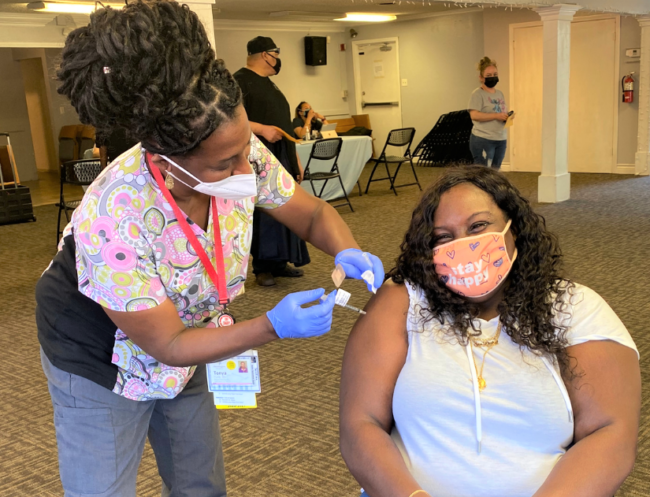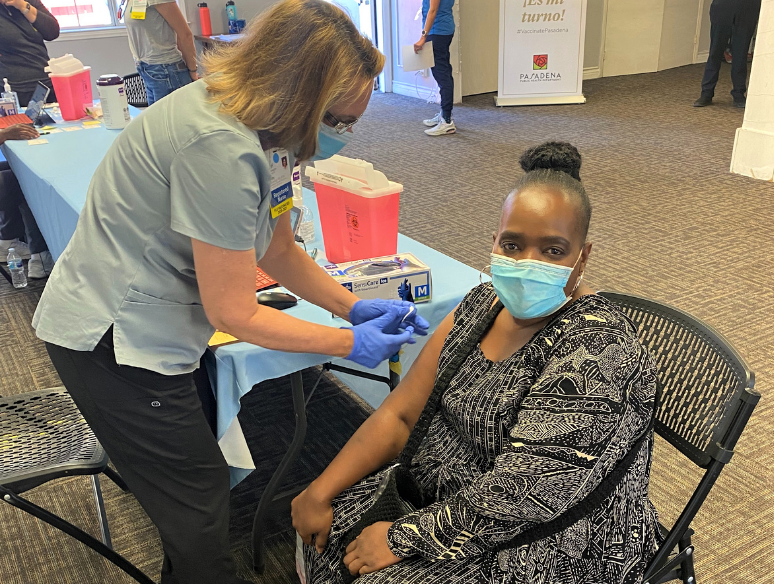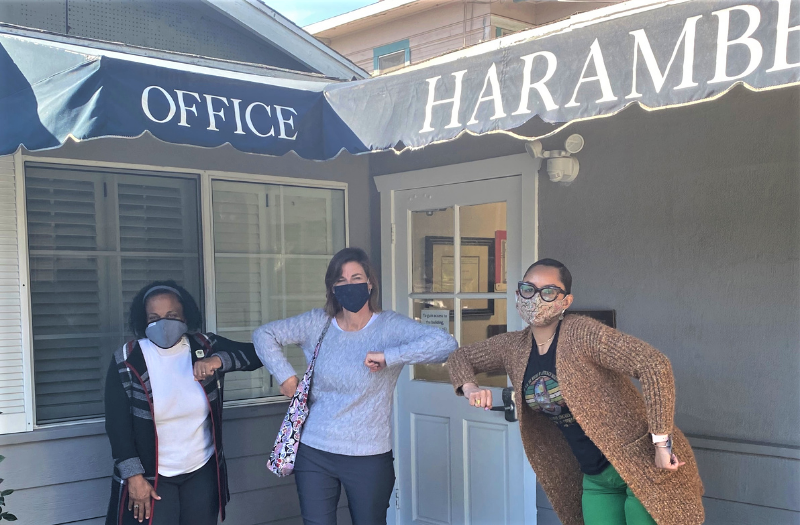 The pop-up clinic at Harambee Ministries is designed for eligible residents of the 91103 ZIP code. Photo courtesy of Huntington Hospital.
The pop-up clinic at Harambee Ministries is designed for eligible residents of the 91103 ZIP code. Photo courtesy of Huntington Hospital.
Pasadena Community Foundation recently funded a partnership that enables Harambee Ministries to host two COVID-19 vaccination clinics for nearby neighbors in Northwest Pasadena. PCF recognizes that getting shots into the arms of all Pasadena-area residents is a critical component of its ongoing COVID-19 response and is proud to facilitate citywide efforts to bolster equity in vaccinations.
The PCF grant allows Harambee Ministries to vaccinate 50 eligible residents – with a special focus on seniors – right in their own neighborhood using vaccines procured from the Pasadena Public Health Department (PPHD). Joining the collaboration is Huntington Hospital (HH), which provided nurses to administer the vaccines and a technical support specialist to create the online registration system and troubleshoot computer issues. This collaboration is the second that the Foundation has funded this month, following a recent grant to Planned Parenthood Pasadena & San Gabriel Valley to enact a similar clinic with the support of PPHD.
A Focus on the 91103 ZIP Code
Although Pasadena has seen broad support and adoption of vaccines, to date there are still more than 4,000 Pasadena residents 65 or older who have not yet received their first dose of the vaccine. The virus is especially dangerous to seniors; here in Pasadena 85% of COVID-19-related deaths have been from this age group. Moreover, research shows that Black Americans are more likely to be hesitant to get vaccinated due to distrust of those administering the vaccine; they are statistically two to three times less likely to be vaccinated than White Americans.

The partnership between Harambee Ministries, PPHD, and HH aims to address these issues and bolster vaccine rates in the 91103 ZIP code, which is 17% Black (the total population of Pasadena is only 9.7% Black) and has a greater share of low-income, under-served households than in other parts of the city. Because low-income residents are less likely to have access to reliable transportation, they are often unable to visit larger clinics held far away. Harambee is a trusted community institution and is located within walking distance of many homes. Additionally, because many older adults lack computer skills needed to navigate online vaccine registration systems, Harambee staff can take a little more time with a “softer touch,” offering one-on-one support to help patients navigate online registration and ensure they come back for their second dose.
A Warm and Supportive Atmosphere
On March 19, PCF Program Director Kate Clavijo visited the first of the two scheduled clinics and was impressed by the professional, efficient operation, staffed by volunteers and HH’s community nurses. “I saw people of all ages walking in who were greeted in a warm, first-name basis from Harambee staff. There appeared to be a notable level of comfort with community members getting the vaccine in a place that is familiar and trusted. Seniors, firefighters, essential restaurant workers, and construction workers were among those getting vaccinated.” The second clinic is scheduled for April 2.

“Our experiences this month in funding the vaccine clinic collaborations at both Harambee Ministries and PPSGV drives home how important it is to partner with organizations that understand their own hyper-local communities,” says PCF President and CEO Jennifer DeVoll. “We know equity is created when we turn to organizations led by people of color and other underrepresented leaders who are well-positioned to reach our vulnerable neighbors.”
